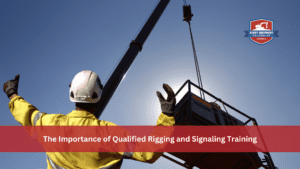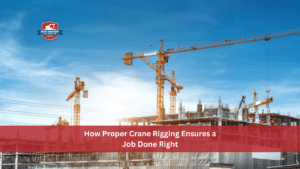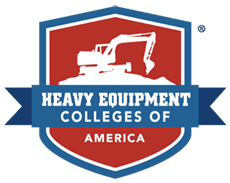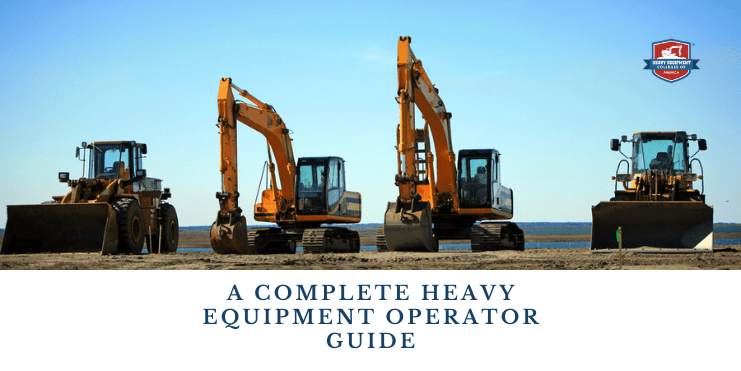Heavy equipment operation isn’t something anyone off the street can do right away. It takes knowledge, skills to safely operate any piece of equipment. You can get all of that by completing programs designed to prepare you for what you’d face in the field.
If you’re still wondering if a career in construction is right for you, take a few minutes to read through this heavy equipment operator guide.
Table of Contents
About the Heavy Equipment Industry
What do the forestry, construction, mining, agriculture, and construction industries all have in common? They all rely on heavy equipment (and operators) to get jobs done efficiently. Using large, powerful machines can help reduce labor costs as well.
Over the years, the need for heavy equipment has increased, which means the need for skilled operators increased as well. Government entities and private companies alike need operators who possess the skills necessary to safely operate the equipment.
What Does a Heavy Equipment Operator Do?
The exact duties an operator performs depend on the type of equipment they’re using. Typically, a heavy equipment operator will use their machine to transport materials, remove or clear debris, or build roads, bridges, and other types of structures.
Some of the types of machines heavy equipment operators use include:
- Cranes: Used for lifting and moving heavy objects in various industries, such as construction, shipping, and manufacturing.
- Bulldozers: Powerful machines used for grading and moving large quantities of earth, rock, and debris in construction and mining.
- Backhoe loaders: Versatile machines used for excavation, demolition, and digging work in construction and landscaping.
- Forklifts: Designed for lifting and moving heavy loads over short distances in warehousing and manufacturing.
- Pavers: Used for laying asphalt or concrete on roadways, parking lots, and other paved surfaces in construction and road maintenance.
- Excavators: Used for digging and moving large quantities of earth and debris in construction and mining.
What Skills Do Heavy Equipment Operators Need?
No matter what piece of heavy equipment you’re operating, you’ll need a general set of skills to accomplish tasks safely.
- Quick decision-making: Heavy equipment operators need to be able to quickly assess situations and make decisions to ensure that operations run smoothly and safely.
- Meticulousness: Attention to detail is crucial for heavy equipment operators to ensure that equipment is maintained properly and used in a safe and efficient manner.
- Ability to excel in a team environment: Heavy equipment operators need to work closely with other team members, including construction workers, engineers, and other heavy equipment operators, to ensure that projects are completed successfully.
- Critical thinking: Heavy equipment operators need to be able to analyze complex situations and think critically to find the best solutions.
- Hand and foot coordination: Heavy equipment operators need to have excellent hand-eye coordination and foot coordination to operate the controls and maneuver heavy equipment safely.
- Ability to endure working in strenuous conditions: Heavy equipment operators need to be physically fit and able to work in extreme weather conditions and challenging work environments.
- Good written and verbal communication: Heavy equipment operators need to be able to communicate effectively with other team members to ensure that projects are completed on time and on budget.
What Jobs Are Available in the Construction Industry?
Construction jobs fall under a couple of different categories . Each is a valuable part of the overall team, making their own contributions to the finished project.
1. Construction Worker/Laborer
In this role, you’d be assigned tasks like clearing and transporting supplies or materials, preparing work sites, and sometimes operating machinery. If you’re looking for a path into the construction industry that doesn’t require training or experience, this may be the role for you.
2. Heavy Equipment Operator
Heavy equipment operators are assigned tasks depending on the machines they are trained and certified to operate. You could be using a bulldozer, crane, forklift, or similar heavy equipment to get the job done. But first, you’ll likely need the right training and certification. With an accelerated program, you can finish a program that provides you with the practical experience and knowledge you need.
3. Plumber
Plumbers are typically in charge of anything related to the pipework. From hot and cold water systems to fuel-burning appliances and more, a plumber can handle it all.
You can become a plumber through an apprenticeship, where you’ll get on-site training. Another pathway is earning your independent plumbing license through a trade school program. You likely need to join an apprenticeship following program completion.
4. Electrician
Electricians are typically responsible for anything involving electricity, connections, and wiring. Installing electrical systems, wiring buildings, and fixing issues with electrical systems are all duties of the electrician. To protect electricians from the hazards of working with electricity, they must wear personal protective equipment like gloves. Electricians also need prior training through a trade school or apprenticeship before working alone.
FAQs About Heavy Equipment Operators
Challenges of Working in the Heavy Equipment Industry
Operating heavy equipment can be a rewarding job, but it’s not without its challenges. From working in harsh weather conditions to dealing with safety risks and physical demands, operators must be prepared to overcome obstacles and prioritize safety. Understanding these challenges is essential for those considering a career in the heavy equipment industry. Checkout these listed challenges below:
- Increasing Environmental Regulations
The use of heavy equipment combined with new construction and building can affect air quality and local environments. Concerns for protecting air quality and our environment have only grown more. To combat this growing concern, green technology and reducing emissions have become major priorities. - Skilled Labor Shortage
The Associated General Contractors of America surveyed nearly 2,000 participants. Here is what they found: about 80% of contractors/construction companies can’t find workers to fill the jobs they have. As construction workers age, more and more skilled laborers will retire. Unfortunately, there are not enough young, experienced workers to help fill in the gap. This also means that people looking to start their careers or switch careers to construction have an edge. Here is your chance to develop the skills employers are looking for in an accelerated program. - New Technology
New technology advances are typically a good thing. However, new equipment is usually expensive, making it hard for companies to keep up. After all, each company wants an edge over the competition, and new equipment is usually an easy differentiating factor.
Must-Have Heavy Equipment for Construction
As you evaluate the different types of construction projects that you are taking on, you may decide that you need more or different types of equipment to complete the tasks. Here are seven must-have pieces of equipment for construction workers and business owners:
- Articulated Trucks
This vehicle is typically used to navigate building sites and has two main components—the cab and the trailer. It can move over rough terrain and uneven surfaces and can transport heavy loads. - Asphalt Pavers
This specialized machine lays asphalt in various flat spaces like roads, bridges, and parking lots. You will likely see pavers used in conjunction with dump trucks which carry the roller and the concrete. The dump truck loads concrete into the paver that will lay it on a surface. - Backhoe Loaders
This machine offers versatility—it comprises various types of equipment like a backhoe, loader, and tractor. Backhoe loafers have a loader bucket in the front, and an excavating arm in the back called a backhoe. These are typically used for smaller jobs and can move over uneven and rough terrain. - Bulldozers
Featuring a large metal blade in the front, bulldozers are typically used for pushing or dozing large amounts of soil and other materials. Bulldozers either use large tracks, which help them navigate the terrain without sinking into the ground, or wheels, which help them move faster over paved surfaces. - Excavators
Consisting of a bucket, dipper, boom, and pivotin g cab, excavators are used for material handling, trench digging, demolition, mining, and more. Like backhoe loaders, this type of machine is typically used for small or medium-sized projects. - Compactors
There are various types of compactors that all do the same thing— reduce the size of a material. Businesses or homeowners often use a trash compactor to reduce the volume of garbage production. Landfill compactors can reduce the volume of waste. Soil compactors are used by farmers and other agricultural professionals to reduce the volume of a certain quantity of soil. - Cold Planers
These machines are used for removing concrete and asphalt from a surface. It consists of a large drum that rotates and grinds the surface while cutters simultaneously break up the pavement. The loosened pavement is then pushed to the drum and distributed onto the conveyor belt attached to the cold planer.
The Importance of Heavy Equipment Certification in Construction
Heavy equipment and machinery are a vital part of any construction site. But these powerful machines are as useful as they are dangerous. The difference between safe practices and negligence is often an operator’s certification. That’s why certification is so important. Although not every piece of heavy equipment requires certification, you can bet the ones that do have it for a reason. Having technical and practical knowledge of heavy machinery can help you get tasks done safely and efficiently.
Heavy Equipment Operator Job Outlook
The Bureau of Labor Statistics (BLS) predicts that the heavy equipment operation industry will experience a 5% growth between 2020 and 2030. That’s an average of 51,500 new heavy equipment operator jobs created every year. The average industry salary earned in November 2021 was $67,261, and the general salary range is $56,256 to $76,312.
How To Find a Job as a Heavy Equipment Operator
Are you interested in a job as a heavy equipment operator but don’t know where or how to start? You’re not alone. Plenty of people want to enter this field because of the opportunities. But if you want to find your place among heavy equipment operators, you’ll need to get the right education, training, and certifications. While this can sound like an uphill battle, you can take an accelerated program at HEC that’ll put you on the fast track to finding your next career.
What Are the Safety Risks in the Construction Industry?
No matter what the project is or what equipment you are using, safety always comes first. A construction or building site is full of hazards. That’s why it’s important to always adhere to safety guidelines, machine handbooks, and any other safety instructions you’re given.
Here are the most common injuries reported in the construction industry according to the Centers for Disease Control and Prevention:
- Broken or fractured bones
- Cuts and lacerations
- Burns and scarring
- Loss of a limb or digit
- Stress injuries
- Loss of hearing
7 Tips to Safely Operate Heavy Equipment
Heavy machinery is a powerful tool that can get a lot of work done quickly, but it also presents many dangers. It’s important for operators to prioritize safety and take necessary precautions to prevent accidents. Take heavy equipment safety seriously and adhere to these seven tips for operating heavy machinery:
- Obtain Operator Training
Before using any machine, you need proper training for that machine. This means understanding how to start the machine, checking capacity limits, and staying compliant with operation instructions. - Complete a Pre-Use Inspection
Before operating machinery, check for any damage or irregularities. This includes checking the tire pressure, fluid levels, and more. - Always Wear a Seatbelt
Wearing your safety belt at all times while in the cab will protect you in case the machine rolls over. - Communicate
Stay in constant communication with your supervisor and the ground crew throughout the operation. - Scan Your Surroundings
Worksites are full of hazards. Before and during operation, ensure you look to check your surroundings for additional hazards or personnel. - Follow Load Limits
Each machine has a different capacity limit that must be adhered to. Failing to follow load limits can put you and everyone near you in danger. - Enter and Exit the Cab Properly
Use the three-point rule whenever entering or leaving machinery, which means always having three points of contact. That could be two hands and one foot or two feet and one hand.
What to Consider in Operating Heavy Machinery In Cold Weather
There are several things to consider while operating heavy machinery in cold weather, including the conditions, data from the machines, and the importance of safety. Winter season can bring snow, ice, sleet, and freezing temperatures—you need to plan accordingly.
To help monitor productivity and efficiency, companies typically use telematics that can monitor engine temperatures and other pieces of data. This helps them know whether the machines need maintenance or repairs.
Everyone knows that the winter season means less daylight during the day. That means there’s less visibility as well. Installing proper lighting can help ensure everyone can work safely and efficiently.
Discover Other Engaging Content Here:

Every individual on a construction job site plays an important role in the overall safety and productivity of the project. From crane operators sitting on

If you’re interested in learning more about crane lifting capacity, keep reading. Heavy Equipment Colleges of America (HEC) has got you covered with the industry’s most recent and expert knowledge on what crane load capacity is, and how to calculate capacity for one.

We’ll guide you through the basics of crane rigging and explain how to properly rig a crane to prevent serious consequences.
What Is an OSHA Penalty and How To Deal With an OSHA Penalty
The Occupational Safety and Health Administration has rules set up to penalize companies who ignore standards—intentionally or unintentionally.
When hit with An OSHA violation, a company must follow established procedures.
- Post the citation (or a copy) near the area where the violation occurred. This makes employees aware of the hazards. It must remain there for three working days or until the violation is remedied, whichever is longer.
- Post abatement certification documents near the violation area.
- If you agree with the violation, correct the condition by the set (abatement) date and pay the penalty, if necessary.
- If you disagree, you have 15 working days from the date you receive the citation to contest it.
- You may also request an informal conference with the area OSHA director to discuss the violation.
Technology for Construction Safety
Technology has had a significant impact on various industries, including construction. Today, construction sites are utilizing different types of technology to increase safety for workers. Let’s take a closer look at some of these technologies:
- Wearables
Wearables are smart devices workers can wear that have sensors that can collect and transmit data to an app. The data is transmitted to a system that collects biometric data, GPS, RFID location, and much more. - Drones
Drones are unmanned aerial vehicles that are either remotely controlled or controlled by an onboard computer system. More and more companies are using drones on job sites to identify problems, facilitate communication and surveillance, and assist in search operations. - Sensors
Sensors can help monitor site conditions and detect changes in environmental conditions. They can also detect the presence of toxins and alert personnel to improve working conditions. Using sensors can help improve equipment and material management since they can track materials in real-time. - Virtual Reality
While not used on a job site, virtual reality (VR) can be very useful for training workers safely. VR technology allows workers to perform near-life-like tasks and practice the skills they’ll use in the field.
Employers’ Steps To Reduce Workers’ Risks After COVID-19
Employers should follow recommendations provided by federal, state, and local governments and health agencies. Another key consideration is to assess the risk associated with worksites and the jobs workers perform:
- Where, how, and to what sources of SARS-CoV-2 workers might be exposed. This may include the general public, customers, coworkers, sick people, and more.
- Risk factors at home and in the community.
- Individual risks, including age, pregnancy, underlying conditions, and compromised immune systems.
- Controls needed to assess and address the risks.
Skilled heavy equipment operators are an essential part of the construction industry and other work environments that require the use of heavy machinery. However, the safe and effective operation of such machinery requires extensive training. If you are considering becoming a heavy equipment operator, this guide will take you step by step from where you are currently to a new in-demand career in the cab of a backhoe, dozer or other heavy equipment:
- Research – Take your time in researching career opportunities in heavy equipment and what the advantages of being an operator are. You’ll also want to look into the types of equipment out there and what education, training, or certifications you need before you can operate them.
- Find a Training Program – Not all training programs or schools offer what you need to start a new career. Check program lengths, curriculum, and career services. You should also look at where the school is in comparison to where you live.
- Take Schooling & Training Seriously – The information and hands-on experience you gain are vital to your safety and success. Regardless of program length and curriculum, you need to study hard to ensure you know what you’re doing when the real test comes.
- Use School Resources – Many schools offer career services that can help you find employment, work on your resume writing, or conduct mock interviews. You should also take advantage of any connections or networking opportunities you come across during your schooling.
- Pass Certifications Exams – Some machines require certifications before you can safely operate them. Certificates are typically administered by the National Commission for the Certification of Crane Operators (NCCCO). Ask your instructor about certifications and how you can attain them.
Find Your HEC Location and Available Programs
1. California
Our location in sunny San Bernardino offers students different programs that develop the skills needed to start their careers. This location is an approved testing site by the National Commission for the Certification of Crane Operators (NCCCO).
Programs offered:
- Certificate of Heavy Equipment Operations – Level I
- Certificate of Heavy Equipment Operations – Level II
- Certificate of Heavy Equipment Operations – Mobile Crane
2. Washington
Located in Lakewood, Washington, this campus is open for DoD SkillBridge and veterans only; active-duty military and veterans alike are encouraged to apply. This location is an approved testing site by the NCCCO.
Program offered:
- Certificate of Heavy Equipment Operations – Mobile Crane
3. Oklahoma
Break into the heavy equipment industry at our location in the heart of Oklahoma City. This location is an approved testing site by the NCCCO.
Programs offered:
- Certificate of Heavy Equipment Operations – Mobile Crane
- Certificate of Heavy Equipment Operations – Level I
- Certificate of Heavy Equipment Operations – Level I & II
- Certificate of Heavy Equipment Operations – Lattice Boom Crawler Crane
- Associate of Occupational Science in Heavy Equipment (AOS)
4. Georgia
Our Georgia location in Stonecrest is our east coast hub for students to learn and grow their careers. This location is an approved testing site by the NCCCO.
Programs offered:
- Certificate of Heavy Equipment Operations – Level I
- Certificate of Heavy Equipment Operations – Level II
- Certificate of Heavy Equipment Operations – Mobile Crane
- Certificate of Fixed Cab Crane Operation with Rigging and Signaling
- Certificate of Heavy Equipment Operations – Lattice Boom Crawler Crane
- Associate of Occupational Science in Heavy Equipment (AOS)
What Does the Future Hold?
The Associated Builders and Contractors estimate that 590,000 workers will need to be brought into construction in 2023. Along with that, the Biden-Harris administration announced an infrastructure program back in March 2021 that will increase construction projects—with $1.5 trillion going toward infrastructure.





